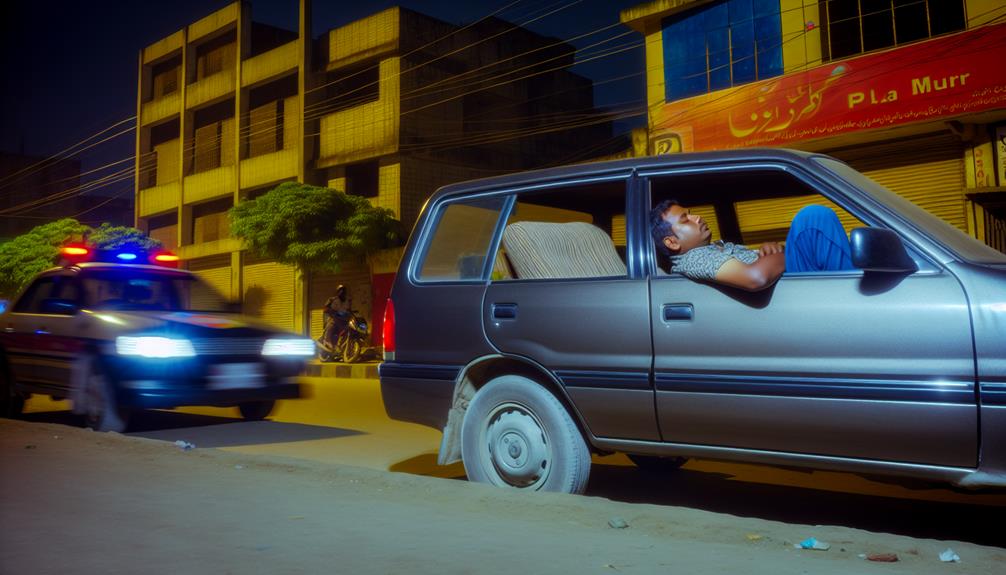When it comes to the legality of sleeping in your car in the United States, the answer isn't as straightforward as one might think. While some states have clear regulations allowing it, others have restrictions or outright prohibitions.
Understanding the nuances of these laws and knowing your rights can make a significant difference in how you navigate this issue.
Stay tuned to uncover the legal considerations, state-specific regulations, safety tips, and alternatives that can shed light on this complex yet crucial aspect of car sleeping in the USA.
Key Takeaways
- Privacy rights are crucial when considering sleeping in a car.
- State-specific regulations in California and New York impact car sleeping.
- Safety tips include parking in well-lit areas and staying vigilant.
- Exploring alternatives like camping or hostels can enhance comfort.
Legal Considerations for Sleeping in Vehicles
Sleeping in vehicles raises legal considerations that vary by jurisdiction in the United States. One key aspect to consider is privacy rights. Individuals sleeping in their cars have a reasonable expectation of privacy, even in public spaces. However, this right is not absolute and can be subject to limitations based on local laws and circumstances.
In many cases, laws regarding sleeping in vehicles focus on the location where the vehicle is parked. Public spaces, such as streets or parking lots, may have specific regulations governing overnight stays. These regulations aim to balance individuals' privacy rights with public safety concerns, such as loitering or vagrancy.
Understanding the interplay between privacy rights and regulations in public spaces is crucial for anyone considering sleeping in their vehicle. Being aware of the legal landscape can help individuals make informed decisions to avoid potential legal issues while ensuring their safety and well-being.
State-Specific Regulations on Car Sleeping
Considering the diverse legal landscape across the United States, it is essential to understand the state-specific regulations regarding sleeping in vehicles.
In California, overnight parking or sleeping in a car is subject to restrictions in various municipalities. For example, in Los Angeles, it is prohibited to live in a vehicle. The city of San Francisco also has regulations against vehicle habitation.
On the other hand, New York has laws that allow for sleeping in a parked car, as long as the vehicle is legally parked. However, it is crucial to check local ordinances as some areas may have restrictions or permit requirements.
Understanding the nuances of each state's regulations can help individuals make informed decisions when it comes to sleeping in their cars. Being aware of California restrictions and New York laws can guide individuals on where it may be permissible to sleep in their vehicles while adhering to the law.
Safety Tips for Sleeping in Your Car
To ensure a safe experience when sleeping in your car, it is imperative to be aware of key safety tips that can help mitigate potential risks and ensure a restful night under such circumstances.
- Privacy concerns: Park in well-lit areas to avoid unwanted attention and consider using sunshades or curtains to increase privacy.
- Security measures: Keep your doors locked and windows closed to prevent unauthorized access to your vehicle.
- Emergency kit: Have a fully stocked emergency kit including essentials like water, food, a flashlight, and a first aid kit.
- Plan your location: Research safe parking locations ahead of time, such as designated rest areas or campgrounds.
- Stay aware of surroundings: Before settling in for the night, take note of your surroundings and trust your instincts if something feels off.
Alternatives to Sleeping in Your Car
When seeking alternatives to resting in your vehicle, exploring various lodging options can offer a more comfortable and secure sleeping environment. Camping options provide a cost-effective way to enjoy nature while having a designated space to sleep. Many campsites offer amenities like restrooms, showers, and cooking facilities, enhancing the overall experience. Additionally, camping allows for a more peaceful and secluded setting compared to urban environments.
Another alternative is hostel stays, which can be an affordable option for travelers seeking a bed for the night. Hostels often provide communal spaces, kitchen facilities, and social activities, making them a popular choice among budget-conscious individuals. Staying in a hostel can also offer the opportunity to meet fellow travelers and exchange stories and tips.
Common Misconceptions About Car Sleeping
Numerous misconceptions surround the practice of sleeping in your car, often leading to confusion and misinformation regarding its legality and safety. Despite the increasing number of individuals resorting to car sleeping, various myths persist that influence public perception and individual decisions.
- Privacy Concerns: Many believe that sleeping in a car compromises privacy, fearing exposure to passersby or potential legal issues.
- Public Perception: There is a common misconception that individuals sleeping in cars are always homeless, leading to negative stereotypes and societal judgment.
- Health Implications: Some wrongly assume that sleeping in a car is as restorative as sleeping in a bed, overlooking the potential physical strain and discomfort it can cause.
- Social Stigma: Car sleeping is often stigmatized, with misconceptions linking it solely to poverty or failure, disregarding the diverse reasons individuals may choose this option.
- Safety Concerns: Contrary to popular belief, sleeping in a car can pose safety risks depending on the location, weather conditions, and the individual's vulnerability.
Frequently Asked Questions
Can I Be Fined for Sleeping in My Car in a Public Parking Lot?
Sleeping in your car in a public parking lot may result in fines due to local regulations. Car camping and overnight parking laws vary by jurisdiction. It is advisable to check with local authorities to ensure compliance.
Are There Any Restrictions on Sleeping in My Car on Private Property?
Respecting property rights is crucial when considering sleeping in your car on private property. Be mindful of parking regulations and obtain permission from the owner. Always prioritize legality and respect for others' spaces to avoid potential issues.
Can I Be Arrested for Sleeping in My Car in a Residential Area?
Sleeping in a car in a residential area may lead to potential arrest due to noise complaints or safety concerns. It is essential to adhere to local laws and regulations to avoid legal ramifications.
Are There Any Specific Laws Regarding Sleeping in a Car While Parked on the Side of the Road?
When considering specific laws related to sleeping in a car parked on the side of the road, it's essential to analyze camping regulations and legal implications. Similar to pitching a tent in a park, understanding applicable laws is crucial.
What Are the Consequences of Sleeping in My Car While Under the Influence of Alcohol or Drugs?
Sleeping in a car while impaired by alcohol or drugs can lead to serious consequences. Impaired driving laws apply even if the vehicle is stationary. Public intoxication may result in fines, arrest, or other penalties.
Conclusion
In conclusion, sleeping in your car in the USA can be legal, but it is important to be aware of state-specific regulations and safety considerations. It is crucial to research and understand the laws in your area before deciding to sleep in your vehicle.
Additionally, exploring alternative options for accommodation can help ensure a safe and comfortable rest. Remember, when it comes to sleeping in your car, knowledge is power.

